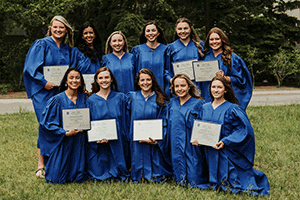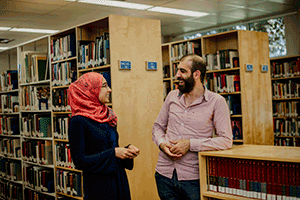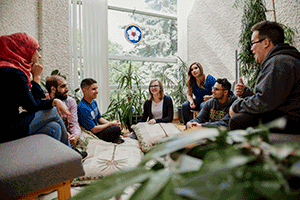Ready to learn more?
Get all the details straight to your inbox!

Luther College students are U of R students and receive all the same benefits. Upon graduation you will receive a U of R degree.

Wondering where to live? Our student residence, The Student Village at Luther College, is considered a great choice for first-year student accommodation. Individual private rooms mean you can stick to your own schedule and you never have to deal with roommate hassles.

Luther College is recognized for its high standards of teaching, focused research, and one-on-one academic advising. We value and protect this heritage of excellence in scholarship, freedom of inquiry, and faithful seeking after truth.

You can book a tour of Luther College, the U of R campus, and our student residence, The Student Village at Luther College, any time throughout the year. Contact our Recruitment Office at 1-306-206-2117.

The Luther Library has over 24,000 items in its collection, 5,000 books checked out per year, and 7,000 students who come through its door per month.

Luther College appeals to students who want to study in a safe, nurturing, and inclusive environment. We welcome students of all faiths, ethnicities, backgrounds, religions, genders, and sexual orientations.

Living in The Student Village at Luther College, our student residence, comes with a choice of healthy, nutritious meal plans. That means no grocery shopping, no meals to cook, and no dirty dishes to worry about. You can focus on your studies and wellness!

To enrol as a Luther College student, simply fill out the University of Regina application form and select Luther as your campus of choice.
Get all the details straight to your inbox!
After a lengthy—too-lengthy, I fear—hiatus, Impetus has returned, to offer ideas and images from members of the Luther College community. Readers who have been following Impetus will notice some significant changes in the editorial personnel. Dr William A Stahl, who founded the webzine in 2010, has retired after a lengthy and distinguished career as Luther’s professor of Sociology. Bill, of course, was much more than that: a colleague generous with his time and his advice; an astute political commentator; a gleeful curmudgeon, never one to suffer fools at all, let alone gladly, but always willing to reward genuine insight and reflective decision-making. His desire to provide a forum for the immense creativity and deep thought that exists within the Luther community led to Impetus. Bill was aided considerably by the tireless efforts of Jennifer Arends, who brought the webzine into being, and who brought along her discerning editorial eye and her keen judgement. Dr Yvonne Petry also lent considerable editorial skills, and diligently read submissions from students and faculty alike. Both of these invaluable individuals have been called to other duties, leaving a woefully inexperienced—and normally dazed and confused—new editor more dazed and confused than usual. However, this new editor must gratefully acknowledge the support he has been given both by the aforementioned Jennifer Arends and Yvonne Petry, but also by Michelle Clark and Dr Francesco Freddolini (both of them newcomers to Luther College, and both displaying far greater deftness and ease with transitions than I could ever hope to show). All of us who now comprise the Impetus editorial board hope that this new version will be worthy of the old, and will continue to offer the same high quality articles, images, and insights Impetus readers have come to expect.
This issue of Impetus offers three challenging perspectives on religion and culture, each in their own way compelling us to rethink what we think we already know. The Impetus staff believe that the pieces in this issue will illustrate the point made in Bill Stahl’s excellent convocation address: that “The liberal arts educate people to engage the world, to create, to transform.” Each of these pieces invites the reader to reconsider and engage with received ideas; we also hope these pieces will encourage readers to carry the results of their encounters into their own lives, and, in however small a way, to effect a little transformation of the world.
Solveig Nilson, a recent Luther graduate and the recipient of the Spring 2012 Luther Medal of Distinction, offers an insightful study of Mormon beliefs, dissecting how the LDS Church—which defines itself as Christian—actually manages to redefine what we consider to be some of the most basic aspects of Christianity. Nilson’s paper is important to keep in mind, as she reminds us, since a member of this too-often-misunderstood group came close to assuming the US presidency last November. By contrast, Volker Greifenhagen, professor of Religious Studies and current Academic Dean of Luther College, presents us with a perspective on a group whose marginal status can be almost assumed: LGBTIQ Muslims. Taking his cue from a re-reading of the familiar biblical and qur’anic story of Lot, and the destruction of Sodom and Gomorrah, Greifenhagen takes us through a careful reconsideration of the place of alternative sexualities within Islam, again presenting us with a fresh perspective on a faith whose monolithic representation in popular culture tends to keep alternatives on the margins as well. Finally, Regan Shercliffe professor of Psychology at Luther, who recently returned from an extended leave to work with the UN in Afghanistan, offers his evocative photographs of sites of worship in Asia and Europe. These images remind us how firmly faith is contained within everyday life. They are silent, but not less challenging, counterparts to the two papers.
On behalf of the editorial staff at Impetus, I hope you enjoy the selections in our latest issue.